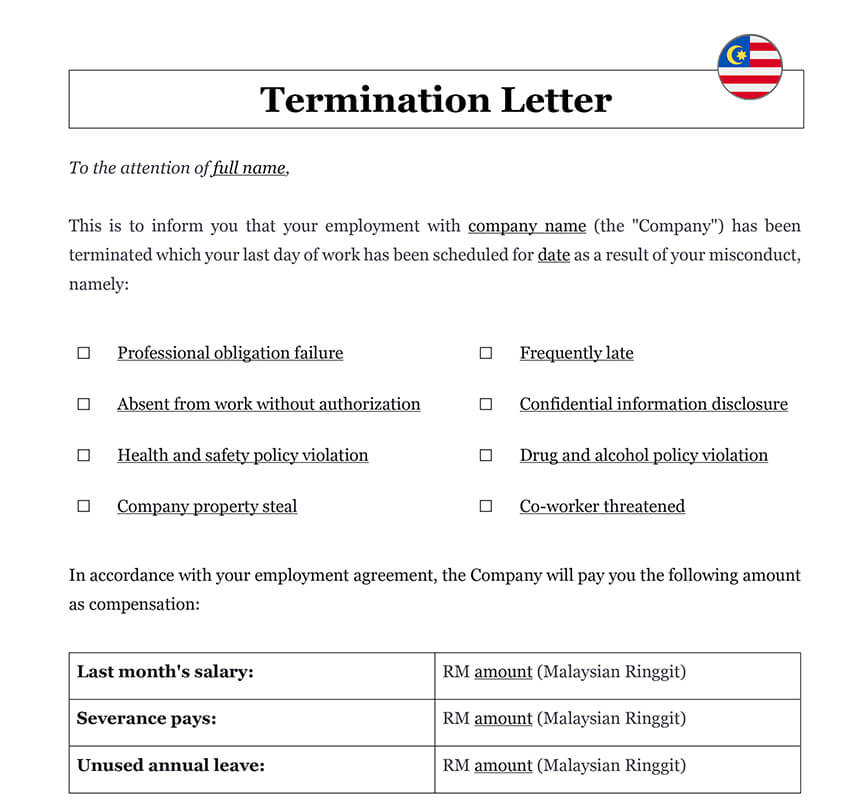Evaluating the grounds to terminate an employee
The employer can first write a Warning Letter in order to to alert the employee. If this is insufficient and the employer wishes to write an Employment Termination Letter, then there are certain steps that must be followed. The grounds for termination must be based on a valid reason, such as misconduct, poor performance, redundancy, or the expiration of a fixed-term contract. The employer must be able to provide evidence of the reason for termination, such as documentation of the employee’s poor performance or misconduct. It is important to thoroughly evaluate the grounds for termination to ensure that they are in compliance with the provisions of the Personal Data Protection Act to minimise the risk of legal action by the employee. In some cases, it may be necessary to conduct an investigation or hold a disciplinary hearing before terminating an employee’s contract.
Giving notice before to dismiss an employee
Giving notice is a common practice before writing an employment termination letter or terminating a rental or Lease Agreement. The notice period required varies depending on the type of contract and the agreement between the employer and employee For employees, the minimum notice period is one month, but it can be longer if specified in the Employment Contract. It is important to follow the correct procedure and give the appropriate notice in writing to avoid any legal issues or disputes.
ℹ️ Before writing a termination letter, the employer can give the employee an employee warning letter. Also, it is good practice to have the notice confirmed in writing by the recipient to avoid any misunderstandings or miscommunication.
Providing payment in lieu of notice
In Malaysia, payment in lieu of notice is a type of severance payment that an employer may offer to an employee who is being terminated without the required notice period. This type of payment serves as a compensation for the notice period that was not served. The amount of payment in lieu of notice is usually equal to the salary that the employee would have received during the notice period. However, it is important to note that the offer of payment in lieu of notice is not mandatory under Malaysian law and it depends on the terms of the employment contract or collective agreement. The employer and employee must come to an agreement on the amount of payment in lieu of notice, and it should be stated in writing to avoid any disputes in the future.
Providing benefits when terminating an employment contract
In Malaysia, termination benefits refer to the compensation provided to employees upon the termination of their employment. These benefits are used when an employer decides to terminate an employment contract. They can include payment in lieu of notice, severance pay, or other forms of compensation such as payment for unused annual leave or long service leave. The eligibility and amount of termination benefits are governed by the Employment Act 1955 and the terms of the individual employment contract. Employers are required to provide severance pay to employees who have worked for at least two years and are terminated due to redundancy, retirement, or the closure of the business. The amount of severance pay is based on the employee’s length of service and the last drawn salary. It is important to note that termination benefits are not mandatory for all employees and may vary depending on the terms of the employment contract or collective agreement. Employers and employees should have a clear understanding of their obligations and entitlements regarding termination benefits to avoid any disputes.

Holding a meeting to fire an employee
| ➤ This meeting provides an opportunity for the employer to discuss the reasons for wanting to terminate an employment contract and to provide information about the employee's entitlements, such as termination benefits and severance pay. |
| ➤ The termination meeting should be held in a private and respectful setting, and the employer should be prepared to listen to the employee's concerns and answer any questions they may have. |
| ➤ The employee should also be given an opportunity to provide their perspective and to ask questions. |
| ➤ The outcome of the termination meeting should be documented in writing, and a copy should be provided to the employee for their records. |
The termination meeting should be carried out in a professional and respectful manner, as it can have a significant impact on the employee’s future job prospects and well-being.
ℹ️ It is recommended that the employer bring a witness, such as a human resources representative, to the meeting to ensure that the termination process is carried out fairly and transparently.
Following up with written confirmation
After the termination meeting, the employer should provide the employee with a written letter of termination, which should include the date of termination, the reason for the termination, and a summary of any termination benefits or severance pay that the employee is entitled to receive. The letter should also confirm any outstanding obligations, such as the return of company property, and any final payment details. It is important that the written confirmation of termination is accurate and concise, as it serves as a legal record of the termination and may be used as evidence in any future disputes. The employee should be given an opportunity to review and sign the letter of termination, and a copy should be kept on file by both the employer and the employee. By following up with written confirmation, the termination process can be carried out in a transparent and fair manner, reducing the risk of disputes and misunderstandings.
Keeping records after terminating a worker
It is important for employers to keep records of employment termination for a certain period of time, as required by law. The records should include :
1. The reason for termination
2. Any severance or termination payment given to the employee
3. Documentation of any notice or unemployment benefits received.
This information is important for a number of reasons, including ensuring compliance with the country’s labor laws and regulations, resolving any disputes that may arise in the future, and providing information for employment verification. Employers should also be mindful of their obligations under Malaysia’s Personal Data Protection Act, which requires that they protect the privacy and personal information of their employees. By keeping accurate and up-to-date records of employment termination, employers can ensure that they meet their legal obligations and protect their interests.
In order to conclude, termination of employment can occur for several reasons, including mutual agreement between the employer and employee, redundancy, and termination for misconduct. Regardless of the reason, the Malaysian Employment Act requires employers to provide fair and reasonable notice or compensation in lieu of notice. Help from our lawyers can be important for both the employer and employee so they can understand their rights and obligations in the event of termination to ensure a smooth and fair process.
Ask our Experts in Labor Law to help with your Employee dismissal
310 client reviews (4.8/5) ⭐⭐⭐⭐⭐











